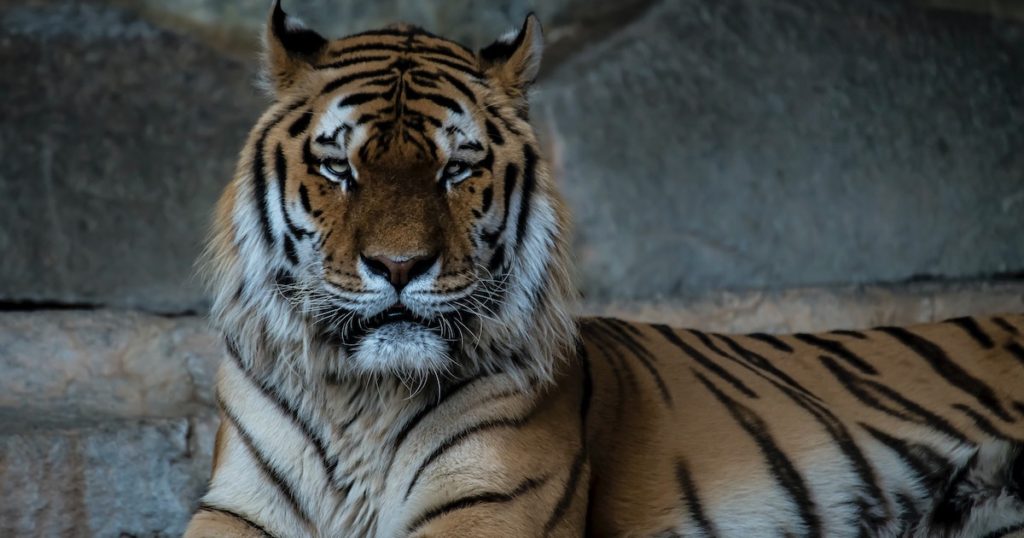Lions in Africa and tigers in Asia are in peril in their native habitats — the victims of retribution killing, the trade in their parts (tiger penises and lion bones), human encroachment and habitat fragmentation, and, in the case of the lions, trophy hunting. But in the United States, they are strangely abundant not only at accredited zoos, but also roadside attractions and in private homes as pets.
In the latest episode of The Animal Wellness Podcast, host Joseph Grove talks with Animal Wellness executives Wayne Pacelle and Marty Irby about the phenomenon, and brings Carole Baskin, president of Big Cat Rescue in Florida, into the conversation. Carole and her team at Big Cat Rescue have dozens of cats discarded by people in the exotic animal trade at their Tampa-based sanctuary. These animals are ambassadors for the larger set of big cat victims, underscoring that the United States should have stronger policies to forbid private ownership and to stop roadside attractions from exploiting these creatures, including cub-petting displays.
When shady zoos use them as bait for commerce or private citizens treat them as novelties to be kept as pets, it almost never ends well for these creatures. They are not suited for life with inexperienced and under-resourced operators. Too often, they are off-loaded, and animal welfare groups are forced to step up and provide a safety net for their remaining years. When you add up the costs of this transfer of big cats from private citizens to animal welfare groups, it collectively represents a massive unfunded liability for animal welfare groups, which spend millions each year to manage animals who never should have been put at risk by unscrupulous or unthinking people in the first place.
The discussion moves toward the importance of passing the Big Cat Public Safety Act, which seeks to shut the door on the trade in these animals as pets and to stop the use of cubs or kittens in commercial petting displays. At five or six months of age, the animals are too big and dangerous to be handled, and they are cast aside or warehoused in unsuitable conditions. To its great credit, Big Cat Rescue has been leading the fight for this legislation, and in this episode, we take a close look at the debate in Congress.
The Animal Wellness Podcast is a weekly 30-minute segment that not only delivers timely information but offers insights and analysis you won’t hear anywhere else. We’ll offer in-depth discussions of local, state, or federal policy and elections, and the effects of laws and regulations on corporations. We hope you’ll listen to Episode 3: Michael Vick and the Continuing Battle Over Animal Fighting, about the renewed attention on convicted dog-fighter and NFL player Michael Vick as well as the December 20, 2019 deadlines for U.S. territories to be in compliance with federal anti-cock-fighting laws. Episode 2: 2019 Shark finning, horseracing, and the PACT Act, includes a layered discussion of how the committee process works and why it’s so difficult to even get a common sense measures into law. If you missed our first episode, you can listen to Episode 1: 2019 Victories for Animals, by clicking here.
Wayne Pacelle is the founder of Animal Wellness Action, president of the Center for a Humane Economy, and former president of the Humane Society of the U.S. who conceived the idea of the PACT Act. He founded the Humane Society Legislative Fund and prior to that, he was executive director of The Fund for Animals. The Non-Profit Times named him seven times as one of the nation’s top 50 non-profit executives, and in 2005, he was named executive of the year. Pacelle is a two-time New York Times best selling author of The Bond and Humane Economy.
Marty Irby is the executive director at Animal Wellness Action. Irby worked in the United States House of Representatives for Congressman Ed Whitfield (R-KY) serving as Communications Director and Agriculture Policy Advisor. He is a former president of the Tennessee Walking Horse Breeders’ and Exhibitors’ Association, a Heritage Foundation Congressional Fellow, former director of equine protection and rural affairs at the Humane Society of the U.S., and native of South Alabama who grew up on a horse and cattle farm. He graduated from the University of South Alabama with a degree in Communications, and attended Wesley Theological Seminary in Washington, D.C.
Joseph Grove is a freelance writer and six-time recipient of awards from the Society of Professional Journalists. His background also includes hosting a radio show called Jargon on WQMF FM in Louisville, Ky., and podcasts for Bisig Impact Group and Southern Gaming and Destinations. He began dedicating his volunteer time to animal issues in 2014 and currently works as a court-appointed special advocate for children in family court in Shelby and Spencer Counties in Kentucky.
